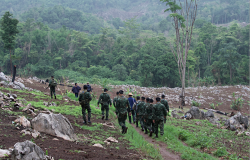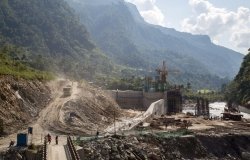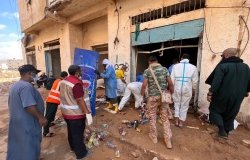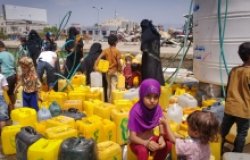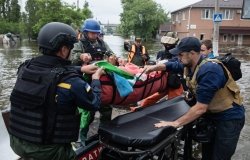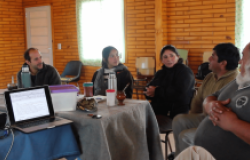Environmental Security Is Hot Topic at the 2008 International Studies Association Conference
MAY 2008—ECSP Director Geoff Dabelko Participates in Three Popular Panels
Environmental security issues emerged as hot topics at the 49th International Studies Association (ISA) Annual Convention, held March 26-29, 2008, in San Francisco, California. Panels included a notably high number of U.S. military and intelligence faculty and practitioners focusing on nontraditional security threats, including environmental degradation in Africa, climate change, and demographic changes.
Standing-room only crowds attended sessions that included ECSP Director Geoff Dabelko. Chairing a roundtable on "Conflict and Cooperation Over Shared Water Resources," Dabelko asked three leading scholars of water security—Aaron Wolf of Oregon State University, the Pacific Institute's Peter Gleick, and Marc Levy of Columbia University/CIESIN—to name some of the top issues in the field today. In addition to the ISA roundtable, ECSP and the Pacific Institute hosted an informal gathering of water experts to explore next directions for water, conflict, and cooperation research. The two organizations recently released a joint report assessing the availability of comprehensive decision-making support tools for practitioners in the water, sanitation, and hygiene sector.
As a discussant for "Environmental and Human Security in Africa," Dabelko stated that environmental degradation poses both a threat and an opportunity for the U.S. military's new Africa combatant command, AFRICOM, and praised the panelists for analyzing environmental links to cooperation, as well as conflict. The panel was chaired by the U.S. Naval Academy's Helen Purkitt, who, along with the U.S. Air War College's Dan Henk, looked at proposed and existing "peace parks" (transfrontier conservation areas) in sub-Saharan Africa. The U.S. Military Academy's Col. Cindy Jebb and the U.S. Air War College's Stephen Burgess examined the impact of environmental degradation on the volatile countries of the Sahel region and the Horn of Africa, respectively, where they maintained droughts, food shortages, and land scarcity have contributed to conflict and fostered support for terrorism. All the panelists were generally supportive of AFRICOM's efforts to integrate nontraditional development work into the military's portfolio—which, as discussant and retired U.S. Army Col. Maxie McFarland pointed out, it was already doing "by default" in Iraq and Afghanistan. McFarland cautioned, however, that "just because the Army can do it, doesn't mean you want them to do it."
For a roundtable on the "Challenges of Policy-Relevant Research on the Seam Between Physical and Social Sciences," chaired by Robert Odell of the National Intelligence Council (NIC), Dabelko again joined Marc Levy and Aaron Wolf, as well as discussant Greg Treverton of the RAND Corporation, to discuss ways to improve the connections between scholars and policymakers. Dabelko urged the audience to think of it not as a one-way street from science to policy, but as a two-way dialogue, in which academics can learn from practitioners, drawing on their on-the-ground experience to understand the key questions they face. For example, the NIC representatives focused on the problem of predicting future trends, which political scientists traditionally do not do, as an arena for future science-policy collaboration.
Predicting future demographic conflict was the subject of a panel led by NIC analyst and frequent ECSP collaborator Richard Cincotta, "The Global Demographic Landscape in 2025: Implications for International Relations Analysis." Population Action International's Elizabeth Leahy compared projections of selected countries' age structure profiles in 2025, while Cincotta used similar data to predict which countries are more likely to develop full democracies by 2025. University of London Professor Eric Kaufman's "Eurabia" paper explored the impact of Europe's growing Muslim population on domestic stability and international relations. Henrik Urdal and Hegre Håvard of the International Peace Research Institute, Oslo's Centre for the Study of Civil War use projections of youth bulges, total population size, and infant mortality rates to predict the likelihood of conflict through 2050, finding that youth bulges would increase the chances of conflict in the 2030s. Discussant Thomas Mahnken of the Department of Defense praised the panelists for their work, calling it "of great interest to us in the government," given the challenge of predicting trends and shocks, particularly emerging conflicts in countries like Russia, India, and China.
Other popular panels on environmental security included "Climate Change, Natural Disasters, and Armed Conflict" and "The Militarization of Energy Security." For more on these and other environmental security panels, see the "Environmental Security Heats Up ISA" on ECSP's blog, the New Security Beat.
The conference program and participant list can be accessed online. Proposals for the next ISA conference, to be held February 15-18, 2009, in New York, NY, are due May 30, 2008.
To download the papers listed below, please search the online paper archive.
Environmental and Human Security in Africa
- "Environment and Human Security in the Horn of Africa" by Stephen F. Burgess
- "South Africa's Nuclear Strategy: ‘Nuclear Blackmail' in Three Stages and Deterring ‘Total Onslaught'" by Helen Purkitt
- "Human and Environmental Security in Southern Africa: The Kavango-Zambezi (KAZA) Transfrontier Conservation Area Project" by Dan Henk
The Global Demographic Landscape in 2025: Implications for International Relations Analysis
- "Demographic Influences on the Distribution of Full Democracies, 2025" by Richard P. Cincotta
- "Eurabia? The Foreign Policy Implications of West Europe's Religious Composition in 2025 and Beyond" by Eric Kaufmann
- "The Future of Armed Conflict: Predicting the Incidence of Conflict, 2007-2030" by Joachim Carlsen, Hegre Håvard, and Henrik Urdal
- "The Shape of Things to Come: Population Age Structures Today and in 2025" by Elizabeth Leahy
Climate Change, Natural Disasters, and Armed Conflict
- "Drought and Political Violence in Sub-Saharan Africa?" by Christian Webersik
- "Upgrading the Role of ICT in Conflict Early Warning/Response" by Patrick Meier
- "Climate Change, the Environment, and Armed Conflict" by Halvard Buhaug
The Militarization of Energy Security
- "Militarization of Energy Security" by James A. Russell
- "Militarization of Energy Security: The Case of Venezuela" by Harold Trinkunas
- "The Battlefield and the Marketplace: Two Cautionary Tales" by Dan Moran
Additional Papers of Interest
- "Climate Change and Environmental Security: For Whom the Discourse Shifts" by Nicole Detraz and Michele Betsill
- "Discources and Dilemmas of Democratic Consolidation in Nigeria's Fourth Republic" by Paul Orogun
- "Framing Choices and Constructing Change: Post-Conflict Peacebuilding and the Shaping of Environmental Sustainability" by Michael Beevers
- "Health, Risk, and Security: Three Perspectives for International Relations" by Stefan Elbe
Related Program

Environmental Change and Security Program
The Environmental Change and Security Program (ECSP) explores the connections between environmental change, health, and population dynamics and their links to conflict, human insecurity, and foreign policy. Read more
